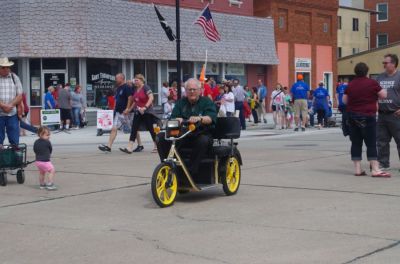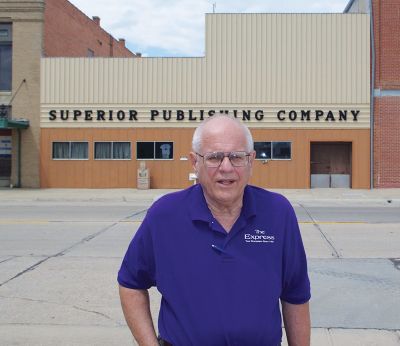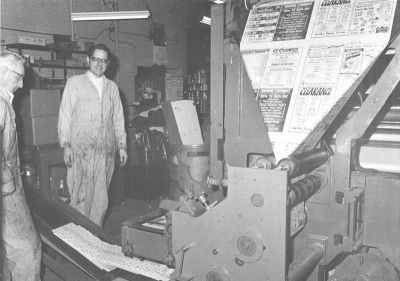Bill Blauvelt is nostalgic for the glory days and hopeful for the future
Teri Saylor
Special to Publishers' Auxiliary
Apr 1, 2021




Bill Blauvelt is both melancholy for newspapers’ glory days of the past and hopeful for a new golden era in journalism as he churns out his three newspapers week after week on his 60-year-old Goss four-unit press.
Blauvelt, who owns and publishes Nebraska newspapers — the Superior Express and the Nuckolls County Locomotive Gazette in Nelson, and the Jewell County Record in Mankato, Kansas — recently reflected on his career and the changes and challenges that come with publishing community newspapers in the 21st century.
“Back in the 1980s, we averaged 24 pages a week,” he said of the Superior Express, his flagship newspaper. “Now we are down to roughly 16 pages or less.”
The COVID-19 pandemic, the failures of the U.S. Postal Service and an economic decline in his coverage area have wreaked havoc on his news products, driving down circulation, forcing his papers to share news and advertising, and to make do with about half the staff he employed during his heyday.
But all is not lost according to Blauvelt, who is surfing the waves of change and owning the future, the same way he navigated his newspaper career.
You could say that Blauvelt was a reluctant publisher. He had his heart set on a career as an electrical engineer to flex his affinity for gadgetry. This might explain why, at the age of 75, he embraces technology and believes that despite the upheavals technology has wreaked on the newspaper industry, it also will help journalism thrive in the future.
Teachers and professors, bribing him with the promise of good grades, dragged him through photography courses in high school and led him to a journalism degree from Kansas State University, where he started out majoring in electrical engineering.
Back home in Superior, with a fresh diploma and his eye on the local newspaper, he hoped its 75-year-old owner would sell it.
“I got a good job as our local chamber of commerce manager, and 10 months later, the newspaper was sold — to someone else,” Blauvelt said. “I was devastated, but the new owners came to me and offered me a 50% share, and on my 24th birthday, having never worked a day in my life at a newspaper, it was announced on the front page of the Superior Express the new editor would be Bill Blauvelt.”
Over the next 40 years, the other owners withered away through death or resignation, and for the last decade, Blauvelt has been the sole owner. Over time, he added the Nuckolls County Record in Nelson, just 13 miles from Superior in the same county as Superior. The Jewell County Record is 22 miles away, just over the Nebraska-Kansas state line.
All three newspapers have a deep legacy in their communities, each rooted in their communities for over 100 years.
“The Superior Express was a daily for a while, but the newspaper shortage during World War II forced it to cut back to a weekly, and it was one of two newspapers in town at the time: The Journal and The Express,” Blauvelt said.
Unfortunately, no early copies of the Superior Express exist today. The publisher at the time did save them, but instead of binding them, he left loose stacks in his morgue and when space got tight at the newspaper, he took them to the local library.
“Then someone cleaned house at the library and didn’t understand why the stack of old newspapers was sitting around and they got ditched,” Blauvelt said. “Today, all we have of the early years are a few copies that made it to the state historical society.”
The pandemic has forced Blauvelt’s newspapers into a downward cycle, and he is sharing news and advertising among all three, but readers don’t seem to mind. In Mankato, they are more concerned with keeping the newspaper’s office open, Blauvelt said. The Nuckolls County Locomotive Gazette office, which is normally open only part time, is closed because of the pandemic. Its two employees are working at home.
Most years, Blauvelt has averaged 15 employees among all three newspapers, but he is now down to eight and relies on freelancers and volunteers to fill in the gaps. He never did a single layoff and relied on attrition to shrink his staff. In addition to publishing his newspapers, Blauvelt writes articles, takes pictures, covers city council and runs his press, which is a bona fide antique and point of pride.
He affectionately calls his machine a “junkyard press,” assembled from assorted salvaged units out of four states, and despite its aging parts and efforts to keep it running, the benefits of having his own press outweigh the challenges of keeping it running. “At 32 inches wide, we have the widest newspaper in Nebraska,” Blauvelt pointed out.
Blauvelt, by default, is also the town’s historian. His life in Superior dates back a couple of generations to his grandfather who was born there in 1882. A few years ago, Blauvelt inherited a collection of photography negatives dating back to World War II. He makes prints and publishes them on Facebook and in the newspaper, delighting readers. They come in handy when he needs a special feature.
During the pandemic, the county fair was canceled. Local kids were able to show their livestock as usual, but neither media nor spectators could attend. For fun, Blauvelt dug out photos from the kids’ livestock show back in 1952. “Those kids are now in their 80s, and they certainly enjoyed seeing themselves in the newspaper after all these years,” Blauvelt said.
That Blauvelt is able to find joy and delight in publishing despite many challenges is a testimony to his resilience and dedication to his community. The pandemic and problems with the postal service makes him sad but curious about what the future holds.
The degraded postal service has wreaked havoc on his production schedule, and no matter how hard he tries to deliver news to his readers in a timely way, the delays are growing longer.
“The newspaper is no long a newspaper. It is a history piece because it’s not being delivered for weeks after it’s printed,” he said. “That also hurts advertising sales, because how can an advertiser count on the newspaper reaching readers in time to take advantage of special sales and promotions?”
Yet, the readers are loyal. And they are making their way to the newspaper’s website, which features news from all three publishing areas.
“I have been amazed at the way people are subscribing to the online edition. It’s very encouraging,” he said. “They still want the print version, but they are eager on Wednesdays for us to put the web edition up.”
Blauvelt, with the natural curiosity that sparked his early interest in electrical engineering, has embraced technology and is looking forward to brighter days ahead.
“I’m not afraid of the future,” he said. “As I was coming up, we saw what needed to be done, and we did it. Those who come along behind us will likely find a better way to do it than we do today.”
Teri Saylor is a writer in Raleigh, North Carolina. Find her at terisaylor@hotmail.com







